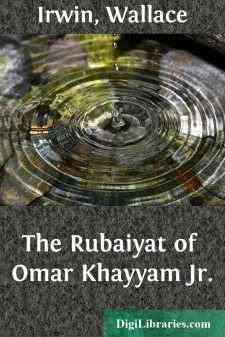Categories
- Antiques & Collectibles 13
- Architecture 36
- Art 48
- Bibles 22
- Biography & Autobiography 813
- Body, Mind & Spirit 142
- Business & Economics 28
- Children's Books 14
- Children's Fiction 11
- Computers 4
- Cooking 94
- Crafts & Hobbies 4
- Drama 346
- Education 46
- Family & Relationships 57
- Fiction 11829
- Games 19
- Gardening 17
- Health & Fitness 34
- History 1377
- House & Home 1
- Humor 147
- Juvenile Fiction 1873
- Juvenile Nonfiction 202
- Language Arts & Disciplines 88
- Law 16
- Literary Collections 686
- Literary Criticism 179
- Mathematics 13
- Medical 41
- Music 40
- Nature 179
- Non-Classifiable 1768
- Performing Arts 7
- Periodicals 1453
- Philosophy 64
- Photography 2
- Poetry 896
- Political Science 203
- Psychology 42
- Reference 154
- Religion 513
- Science 126
- Self-Help 84
- Social Science 81
- Sports & Recreation 34
- Study Aids 3
- Technology & Engineering 59
- Transportation 23
- Travel 463
- True Crime 29
The Rubaiyat of Omar Khayyam Jr.
by: Wallace Irwin
Description:
Excerpt
Since the publication of Edward Fitzgerald's classic translation of the Rubaiyat in 1851 - or rather since its general popularity several years later - poets minor and major have been rendering the sincerest form of flattery to the genius of the Irishman who brought Persia into the best regulated families. Unfortunately there was only one Omar and there were scores of imitators who, in order to make the Astronomer go round, were obliged to draw him out to the thinness of Balzac's Magic Skin. While all this was going on, the present Editor was forced to conclude that the burning literary need was not for more translators, but for more Omars to translate; and what was his surprise to note that the work of a later and superior Omar Khayyam was lying undiscovered in the wilds of Borneo! Here, indeed, was a sensation in the world of letters - a revelation as thrilling as the disinterment of Ossian's forgotten songs - the discovery of an unsubmerged Atlantis. While some stout Cortez more worthy than the Editor might have stood on this new Darien and gazed over the sleeping demesne of Omar Khayyam, Jr., he had, so to speak, the advantage of being first on the ground, and to him fell the duty, nolens volens, of lifting the rare philosophy out of the Erebus that had so long cloaked it in obscurity.
It is still a matter of surprise to the Editor that the discovery of these Rubaiyat should have been left to this late date, when in sentiment and philosophy they have points of superiority over the quatrains of the first Omar of Naishapur. The genius of the East has, indeed, ever been slow to reveal itself in the West. It took a Crusade to bring to our knowledge anything of the schöner Geist of the Orient; and it was not until the day of Matthew Arnold that the Epic of Persia[1] was brought into the proper realm of English poesy. What wonder, then, that not until the first Omaric madness had passed away were the Rubaiyat of Omar Khayyam, Jr., lifted into the light after an infinity of sudor et labor spent in excavating under the 9,000 irregular verbs, 80 declensions, and 41 exceptions to every rule which go to make the ancient Mango-Bornese dialect in which the poem was originally written, foremost among the dead languages!
Although little is known of the life of Omar Khayyam the elder, the details of his private career are far more complete than those of his son, Omar Khayyam, Jr. In fact, many historians have been so careless as to have entirely omitted mention of the existence of such a person as the younger Omar. Comparative records of the two languages, however, show plainly how the mantle was handed from the Father to the Son, and how it became the commendable duty of the second generation to correct and improve upon the first.
Omar Khayyam died in the early part of the eleventh century, having sold his poems profitably, with the proceeds of which he established taverns throughout the length and breadth of Persia. Omar died in the height of his popularity, but shortly after his death the city of Naishapur became a temperance town. Even yet the younger Omar might have lived and sung at Naishapur had not a fanatical sect of Sufi women, taking advantage of the increasing respectability of the once jovial city, risen in a body against the house of Omar and literally razed it to the ground with the aid of hatchets, which were at that time the peculiar weapon of the sex and sect. It is said that the younger Omar, who was then a youth, was obliged to flee from the wrath of the Good Government Propagandists and to take abode in a distant city. For some time he wandered about Persia in a destitute condition, plying the hereditary trade of tent-maker, but at length poverty compelled him to quit his native country for good and to try his fortunes in a land so remote that the dissolute record of his parent could no longer hound him. Borneo was the island to which the poet fled, and here the historian finds him some years later prospering in the world's goods and greatly reverenced by the inhabitants. Although Omar, Jr., was undoubtedly the greatest man that Borneo has yet produced, he must not be confused in the mind of the reader with the Wild Man of Borneo, who, although himself a poet, was a man of far less culture than the author of the present Rubaiyat....



